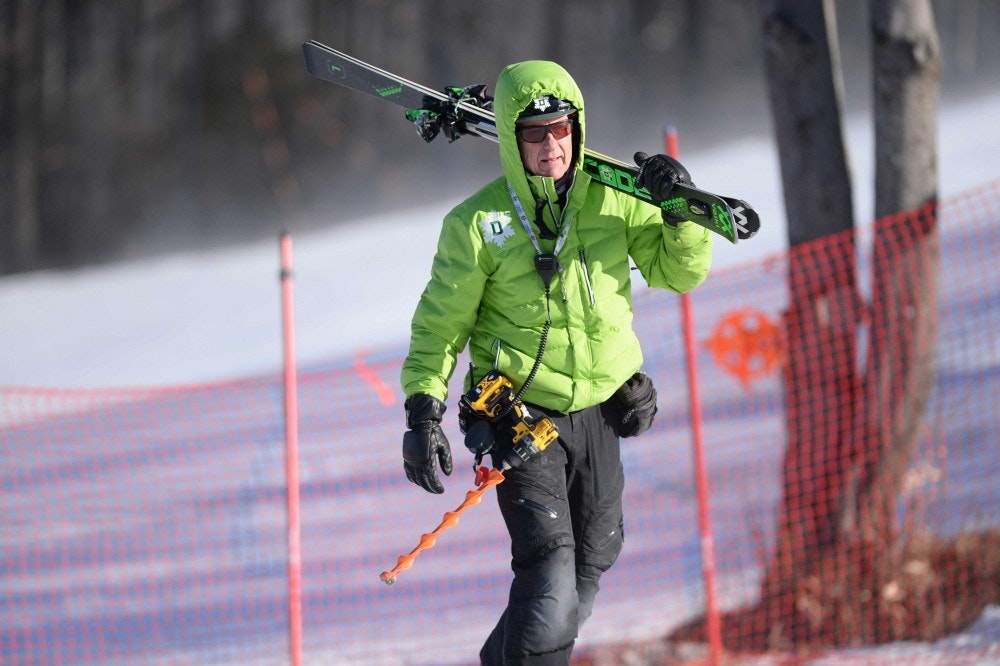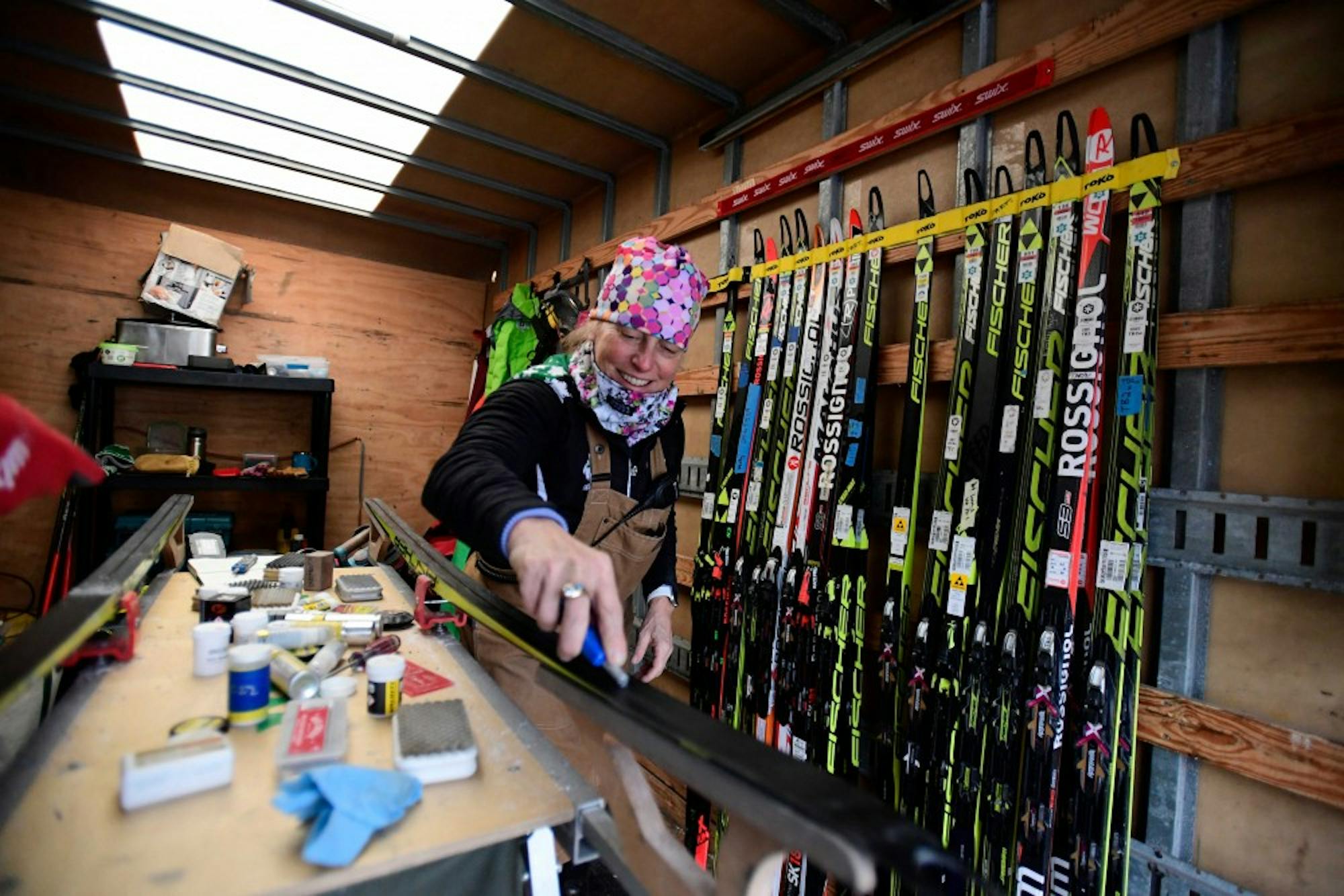In 1985, Cami Thompson Graves and Peter Dodge ’78 found themselves in very different positions — but both trying to make it in professional skiing. The former had just graduated from St. Lawrence University and made the jump to the U.S. Ski Team, which took her to the 1985 World Championships in Seefeld, Austria. The latter was enjoying success on the pro tour, winning the slalom at the Peugeot tour national finals that year, his fifth season since he was rookie of the year in 1980.
By September 1989, their paths had converged in Hanover. Thompson Graves spent just one more year on the U.S. Ski Team before taking a job at Dartmouth as a development coach in 1988. And Dodge, then a pro tour veteran, had begun to consider options outside of racing. When the men’s alpine head coaching job opened up at his alma mater, Dodge jumped on it.
Thirty years later, Dodge and Thompson Graves are still here, Dodge as men’s alpine head coach and Thompson Graves now as director of skiing and women’s Nordic head coach.
A long list of athletes has achieved national and international success on the strength of coaching from Dodge and Thompson Graves. Thompson Graves’ skiers have won 42 All-America honors since 2000, and five of them competed in biathlon and cross-country skiing at both the Pyeongchang Games and the Sochi Games. Thirty-two of Dodge’s skiers since 2000 have been All-Americans, and he has coached several Olympians as well, David Chodounsky ’08 and Patrick Biggs ’06 among them.
Long before they sent skiers to the NCAA championships and the Olympics, Dodge and Thompson Graves both started skiing in their home state of Vermont.
Growing up in St. Johnsbury, Dodge’s whole family skied and his father raced. He and his brother were always on the slopes of the Northeast Kingdom.
“There were a couple little rope tow hills that we could ski in after school during the week, and on the weekends, we’d go to a race or a bigger mountain,” Dodge said.
Like Dodge, Thompson Graves grew up alpine skiing in Vermont, taking after her father, who skied for the University of Vermont.
“We’d ski in the backyard a little bit,” Thompson Graves said. “The mountain was our babysitter.”
Thompson Graves was one of the founding members of the high school ski team in Stowe. Since the team was completely made up of alpine skiers, they all agreed to try both alpine and Nordic to score for their team events.
Thompson Graves initially thought she was going to specialize in alpine skiing.
“In my day, I was built much more like an alpine skier, but I think I liked [Nordic skiers] more,” she said. “They were my people — it just felt like the right place.”
Change in the world of skiing
Over the past three decades, the pair has seen massive change in the world of skiing.
From 1997 to 2006, Dodge served as the president of the Eastern Intercollegiate Ski Association. Before his time as president, college skiing was often a landing spot for European skiers who had fallen past their peak or Americans with little chance of making the national team.
During his time leading the EISA, Dodge pushed for International Ski Federation (FIS) recognition of east coast EISA races. Dartmouth hosted the first FIS UNI race at the Skiway in 1995. After that, the Dartmouth Carnival became a FIS race, and eventually all of the team’s races had been converted. With FIS legitimacy, colleges could attract more European skiers and eventually more skiers would move onto national teams after college.
“It put us in the sights of the national program,” Dodge said.
But according to JP Daigneault ’97, now the head men’s FIS coach at Burke Mountain Academy and Dodge’s team captain during his senior year, it took more than FIS UNI races for Dodge to establish a pathway from college to national teams. “It’s an attitude adjustment that the people running and governing our sport have had to make,” Daigneault said.
“[Dodge] was one of the main drivers, if not the main driver of a pathway to national teams,” he added.
Thompson Graves has also seen an increase in the level of skiing on the Nordic side.
“Nordic skiing is much more mainstream than it used to be, so we attract better athletes,” Thompson Graves said. “It’s not to say we didn’t have any good athletes back then, but we certainly didn’t have as many.”
A major change in the world of Nordic racing was the introduction of skate skiing. Skate skiing, where athletes propel themselves much like ice skaters rather than the classic style of kicking and gliding, provided a major advantage to skiers who made the transition.
“When I got to the [1985] World Championships in Seefeld, everyone was skating and so we” — the skiers on the U.S. Team — “were learning to skate while we were there, and we skated all the races there,” she said.
The massive change to the skiing world didn’t go unopposed.
“We’d have sections of the course where they put fencing up right next to the tracks so that you couldn’t skate, or they tried building snow berms,” Thompson Graves said.
In particular, Scandinavian traditionalists despised the new style. Thompson Graves recalls a crowd “screaming and yelling” at anyone who skated at one relay race in Finland.
The technique is still slowly changing, according to Thompson Graves. She could only see the truly stark contrast after being sent a video of her original 1985 performance.
“It was hysterical to me, to see how bad we were at skating then,” Thompson Graves said.

Men's alpine head coach Peter Dodge '78 has been named Eastern Intercollegiate Ski Association Coach of the Year three times in his 30-year career at Dartmouth.
Coaching at Dartmouth
At Dartmouth, the pair of coaches has continued their record of success.
The moment at the top of both coaches’ list of career highlights is the 2007 NCAA Championships. It was Dartmouth’s first NCAA championship since 1976 and only the third in program history.
“A number of things went our way. We had a good strong team. Not a lot of superstars, but a lot of just really solid athletes,” Thompson Graves said. “I remember being ready to throw up for most of that, if not the last couple days going into it and watching. Lindsay Mann [’07] was our last athlete down on that day and she just nailed it. It was just the coolest thing to be standing there at the finish and the excitement of the team. We were on a high for a long time.”
Over the years, Dartmouth has earned numerous individual titles at the NCAA championships. Most recently, the team earned four individual titles at last year’s meet. Tanguy Nef ’20 won the men’s slalom, Brian McLaughlin ’18 won the men’s giant slalom and Katharine Ogden ’21 won the women’s 15-kilometer freestyle and 5-kilometer classic.
Dodge and Thompson Graves’ accomplishments in NCAA championships have been particularly impressive considering that NCAA championships typically take place during final exams and, unlike schools with scholarships for athletes, Dartmouth is unable to recruit older European skiers.
However, Dodge says that Dartmouth’s D-Plan and lack of scholarships actually benefits its ski program. The D-Plan allowed athletes like four-time Olympian Nina Kemppel ’92 to take sophomore and senior winters off to compete professionally full-time. Without scholarships, athletes aren’t bound to compete in every carnival race, which allows skiers like Tanguy Nef ’20 to alternate between World Cup and carnival skiing.
Spending a winter off campus or missing carnival races to compete on a national team may not benefit the team’s NCAA championship chances, but it is the best possible scenario for skiers hoping to progress beyond the collegiate level.
“We want to do what’s best for the individual,” Dodge said. “That has a trickle-down effect, in that, people see what we’re doing here, they see the kind of skiers we have here, and that attracts the other skiers.”
The success of Dartmouth skiers goes beyond attracting new recruits. According to Kemppel, the women’s Nordic team has always “had the next generation waiting in front of them that they were chasing after.”
According to Dodge, when he is recruiting skiers, Dartmouth “sells itself.”
“The history of the program really helps,” he said.
The emphasis on helping individuals is immediately apparent walking into the ski program’s offices in Robinson Hall. Guests are frequently welcomed by Dodge’s dog. Signed posters and old pennants adorn both coaches’ offices. And whenever the accomplishments of their skiers are mentioned, both coaches smile from ear to ear.
“You become so attached to each and every one of them,” Thompson Graves said. She fondly recalled a skier who, after training hard over three years, skied her first carnival in her junior year and landed a spot on the podium.
“That’s the stuff that just warms your heart, and that’s why we do it,” Thompson Graves said.
Kemppel came to Dartmouth in 1988, the same year as Thompson Graves.
“Cami incubates that culture of inclusiveness,” she said. Thompson Graves made Dartmouth skiing not only a very competitive program, but “a really fun place to ski,” Kemppel said.
When asked about the most memorable stories of her 30-year career, Thompson Graves was quick to mention what she called the “everyday moments.”
She recounted one such moment in practice a week and half ago. Her skiers were trying to ski downhill while lifting up one foot, taking its ski off, spinning the ski around and putting it back on. Small moments in the team van, too, stick out to Thompson Graves.
“We’ll play music and people will be laughing and Cami will be driving the van with this huge grin on her face. I think she just loves the excitement, when all the girls are happy,” women’s Nordic team captain Emily Hyde ’19 said.
Like Thompson Graves, Dodge says some of the breakthroughs are his favorite moments.
“When the lightbulb goes off, or someone gets it, or someone makes a big leap and improves and has a great performance — as a coach, you really like seeing those,” Dodge said.
But even though everyone on the team gets an opportunity to perform, at the end of the day, Dodge can only take a certain number of skiers to carnivals.
“He’s very objective about it, and fair,” Nef said of his coach, whom Skiing magazine once called “a man of few words but meaningful action.”
“[Dodge was] focused on providing the environment and letting the environment challenge us,” Daigneault said.
Sometimes that could be difficult, Daigneault acknowledged, but “it was exactly what I needed,” he said.
Over the years, both Dodge and Thompson Graves have earned the respect of their skiers and of each other.
“[Dodge] is one of the most silently intense individuals that I’ve ever met,” Daigneault said. “I cared about how the team did … but I cared a lot more about making that guy proud of me.”
As for Thompson Graves, “she’s just really steady,” Dodge said. “We just work well together, respect each other. And you know, I let her do her job with the cross country, and I do mine with the alpine.”
Thirty seasons in, Dodge and Thompson Graves will be doing their jobs once again at the NCAA championships as competition returns to their home state next week.




